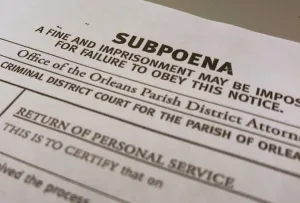This past Thursday, Mark Meadows, Dan Scavino, Steve Bannon, and Kash Patel—former President Donald Trump’s chief of staff, deputy chief, strategist, and Pentagon aide—were all due to provide documents pertaining to the January 6th insurrection attempt. As of Friday, none of them had responded to the request from the House Select Committee investigating the matter, constituting a defiance of Congressional subpoena.
Each of these men was actually issued two subpoenas, requests for information relevant to a legal investigation. Thursday, October 7th, was the due date for the subpoena duces tecum or request for document evidence or information. The subpoena ad testificandum or request for personal testimony, is not set to expire until Friday, October 15th. As such, it looks like they will all defy not one but two Congressional subpoenas, which could carry steep consequences.
Before getting to those, it’s worth asking—even if it appears obvious—why they would refuse these requests. To be clear, each of these people are presumed legally innocent of wrongdoing until proven otherwise. However, it is not a good look to not cooperate. If any one of them had nothing to hide and cared to get to the bottom of a violent attack on America’s Capitol, they’d surely go along with the requests.
The trouble is that even if any of them weren’t directly involved in stoking, endorsing, or collaborating with those involved in the assault—i.e. if any of them are innocent—they wouldn’t cooperate. Mr. Trump and his legal team instructed all these men directly to defy the subpoenas. To betray Mr. Trump, whose personalized form of politics demands unquestioning loyalty, would be to abandon the man and the movement that brought them to power and could again.
Mr. Trump’s, his allies’, and his legal team’s strategy hinges on a claim to executive privilege. This can be invoked to protect the communications of the President against scrutiny, essentially in order to protect executive secrecy.
However, former presidents do not have final say over the invocation of executive privilege. As Harry Truman famously said, the buck stops with the president, and in this case, President Joe Biden has denied Mr. Trump’s plea for executive privilege.
This is a good sign for the effort to bring those involved in the attack on the Capitol to justice, because further action is probably going to depend on Mr. Biden and his administration.
In this case, of course, the subpoenas are not issued by a court of law but a congressional committee of the House of Representatives. That means that Congress has two practical options. The first, which most reporting covers, is for the House of Representatives to vote to certify a charge of contempt of Congress and send it to the President. Then, the responsibility to pursue that charge lies with the Justice Department. Given Mr. Biden’s denial of Mr. Trump’s request for executive privilege, it looks like such a charge would be pursued forcefully.
However, even in such a scenario, this strategy risks the charge and trial getting tied up in the courts, which could cause a huge problem. The other strategy, which gets less airtime, promises stronger results. Each chamber of Congress actually has the power not just to charge individuals with contempt of Congress but, by a vote, find individuals guilty, arrest, and detain them. This is the power of inherent contempt. While more powerful, this hasn’t been used since 1935, so, unfortunately, the likeliest maneuver is to rely on Biden and the Justice Department.
Whatever happens, it’s clear that Mr. Trump and his allies are in this conspiracy for the long haul, willing to put themselves at considerable legal risk just to avoid talking. That certainly doesn’t bode well for our democracy, but it’s equally clear that the House has all the power it needs to compel cooperation or put these lawbreakers behind bars. If they don’t use this power, it may actually be more concerning than Trump’s allies’ refusal to cooperate.
Subscribe to SpectaclesDon't forget to share this article if you found it interesting or leave a comment if you have anything to say!


Comments
Join the conversation